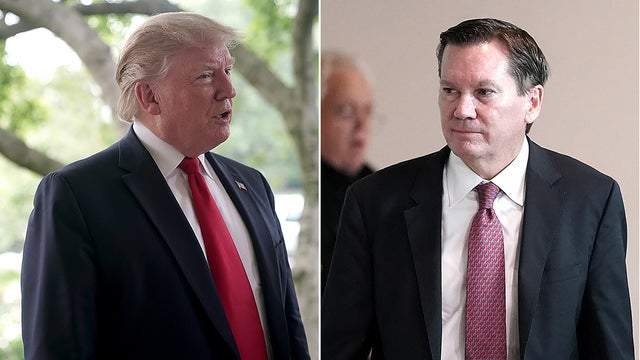Trump takes heat for firing intel watchdog during pandemic

House Intelligence Chairman Adam Schiff (D-Calif.), who spearheaded the impeachment inquiry, voiced incredulity over the weekend that Trump would be “settling scores in the middle of a pandemic.”
“What is this president doing as thousands of people are dying? He is retaliating against people that are on his enemies list and doing it in the dead of night,” Schiff said Saturday on MSNBC.
The Intelligence chairman also claimed that Atkinson’s dismissal was intended to serve as a warning shot to other government watchdogs and federal officials that they will lose their jobs if they cross the president.
Some Republicans also voiced disapproval.
Sen. Susan Collins (R-Maine), a member of the Senate Intelligence Committee and one of the most vulnerable Republicans seeking reelection, said Atkinson’s removal was "not warranted."
“While I recognize that the President has the authority to appoint and remove Inspectors General, I believe Inspector General Atkinson served the intelligence community and the American people well, and his removal was not warranted," Collins said in a statement over the weekend.
The firing came as Trump was entering his most challenging week of the coronavirus, with both cases and related deaths skyrocketing.
But the president came out swinging against Atkinson during a Saturday press conference focused on the outbreak.
Trump railed against Atkinson, Schiff and the whistleblower, saying it was Atkinson’s handling of the whistleblower complaint that led him to lose confidence in the watchdog. The president called him a “disgrace" and argued that he “did a terrible job.”
“He took a whistleblower report, which turned out to be a fake report -- it was fake. It was totally wrong,” Trump said about the readout of his call with Ukrainian President Volodymyr Zelensky. “He took a fake report and he brought it to Congress, with an emergency.”
While Trump has repeatedly dismissed the allegations of the complaint and characterized his call with Zelensky as “perfect,” witness testimony and other evidence presented by House investigators supported much of the whistleblower’s allegations.
The president also indicated over the weekend that he felt there was a lack of loyalty from Atkinson, describing him as “not a big Trump fan.”
Atkinson hit back. He expressed disappointment about his firing in a lengthy statement Sunday night and encouraged other government workers to speak out if they see wrongdoing.
“As an Inspector General, I was legally obligated to ensure that whistleblowers had an effective and authorized means to disclose urgent matters involving classified information to the congressional committees, and that when they did blow the whistle in an authorized manner, their identities would be protected as a guard against reprisals,” Atkinson’s said in a statement disseminated to reporters and lawmakers.
“The American people deserve an honest and effective government,” he added, addressing government employees and contractors. “They are counting on you to use authorized channels to bravely speak up — there is no disgrace in doing so.”
Atkinson, who served at the Justice Department for more than a decade before his inspector general role, also maintained that his career as a public servant was free from “partisan favor or political fear.”
He has not wavered in defense of his whistleblower complaint determination. Last year, as he faced blowback from the president and his allies, Atkinson described the disclosure as “one of the most significant and important of the [Director of National Intelligence’s] responsibilities to the American people.”
Atkinson’s firing comes months after Trump dismissed several administration officials who testified as part of the House impeachment inquiry. After Trump was acquitted, he quickly moved to purge officials like Gordon Sondland, the U.S. Ambassador to the European Union, and Lt. Col. Alexander Vindman, who worked on the National Security Council. Both testified publicly before the House under subpoena.
And although he had no ties to the impeachment inquiry, the White House removed Vindman's twin brother, Lt. Col. Yevgeny Vindman.
William Taylor, a top diplomat to Ukraine who also testified, was recalled from his post early.
Following his firing, lawmakers on both sides of the aisle praised Atkinson for his professionalism, including Speaker Nancy Pelosi (D-Calif.) and Senate Intelligence Committee Chairman Richard Burr (R-N.C.).
Sen. Angus King (I-Maine), a member of the Senate Intelligence Committee, criticized Trump’s move and called for the panel to have an open hearing on Atkinson’s firing with both Atkinson and acting Director of National Intelligence Richard Grenell testifying under oath, Politico first reported Monday.
Some Republicans, like Sens. Chuck Grassley (Iowa) and Shelley Moore Capito (W.Va.), said they wanted more details about the circumstances of Atkinson’s firing before casting judgment.
Still, Atkinson received a powerful vote of confidence for his handling of the Ukraine whistleblower complaint from a group of government watchdogs, led by Justice Department Inspector General Michael Horowitz.
“Inspector General Atkinson is known throughout the Inspector General Community for his integrity, professionalism, and commitment to the rule of law and independent oversight. That includes his actions in handling the Ukraine whistleblower complaint,” said Horowitz, who chairs the Council of Inspectors General on Integrity and Efficiency.
“The Inspector General Community will continue to conduct aggressive, independent oversight consistent with the law,” Horowitz said in a statement, without naming Trump.
Photo: © Greg Nash











